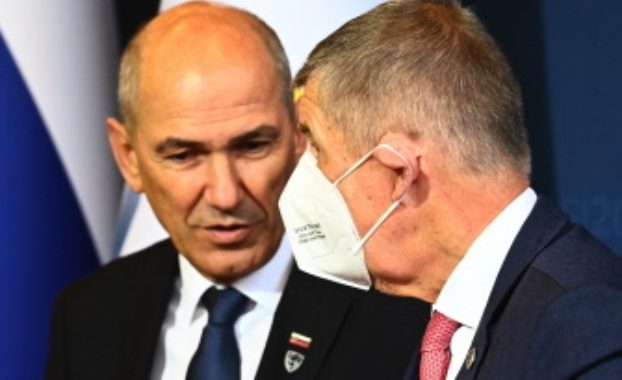
BRDO. European Union (EU) leaders told frustrated Balkan counterparts at a summit on Wednesday the bloc remains committed to letting them join, but offered no concrete progress on their stalled membership bids.
The 27-nation club talked up economic support worth billions of euros for its eastern neighbours at a rain-drenched gathering at Brdo castle in Slovenia, which currently holds the EU’s rotating presidency.
Brussels was keen to show it remains the region’s best hope.
But there set to be no breakthroughs at the meeting with the leaders of Albania, Bosnia, Serbia, Montenegro, North Macedonia and Kosovo on the tortuous path towards membership.
And concern was growing that frustration with years of waiting could push some candidate countries closer to Russia and China.
“We want to send a very clear message and that message is that Western Balkans belong to the European Union, we want them in the European Union,” said European Commission chief Ursula von der Leyen as she arrived for the talks.
“We are one European family and I’m deeply convinced we share the same destiny,” she said.
The EU’s push for enlargement — once a key policy for the bloc — has ground to a halt in recent years. Some richer members fear sparking a new wave of migration and some applicants are struggling with the required reforms, especially on democratic norms.
“In Latvia, the process of joining the European Union was the game changer in terms of enabling reform, and of course in the Western Balkans, they still have some ways to go,” said Latvian Prime Minister Arturs Krisjanis Karins.
However, he cautioned, “either Europe extends the hand, and pulls these countries towards us or someone else will extend the hand and pull the countries in a different direction.”
This reflected the EU’s increasing concern over inroads being made by Moscow and Beijing, which had sent millions of coronavirus vaccines to the region.
Moscow has deep cultural ties with fellow Orthodox nations while Beijing had extended major loans in the region, including a controversial $1 billion for a road, which Montenegro was struggling to pay off.
The EU in response was touting an ‘unprecendented’ €30 billion ($35 billion) economic investment package for the region.
Officials also promise ‘tangible’ improvements for people in the Balkans, such as bolstering vaccine rates to match EU levels this year and ending phone roaming charges.
This may be cold comfort to the candidate countries who were still smarting after France, Denmark and the Netherlands initially held up accession talks with Albania and North Macedonia in 2019.
Bulgaria had since become the main obstacle to progress, refusing to let North Macedonia start the process because of a dispute over history and language.
The leaders of the two countries met together with counterparts from France and Germany, but no advance was made ahead of elections in Bulgaria next month.
“I have no illusions about a quick accession to the EU,” said Serbian President Aleksandar Vucic, whose country applied for EU membership in 2009.
“The political needs of the EU are such that Balkan enlargement is neither a dominant nor a popular issue.”
The EU leaders will close the summit with a final statement, but it was only after fierce haggling that they agreed to say the bloc “reconfirms its commitment to the enlargement process” in a draft seen by AFP.
Diplomats rejected a demand by Slovenia to commit to absorbing the aspirants by 2030.
Brussels scored a minor diplomatic victory in the run-up to the summit by mediating a deal to ease a flare-up in tensions between Serbia and Kosovo.
The former foes were at loggerheads after Kosovo banned cars with Serbian registration plates from entering its territory.
Kosovo proclaimed independence from Serbia in 2008 a decade after a war between independence, seeking ethnic Albanian guerrillas and Serbian forces.
Roughly 100 countries, including all but five EU members, recognised the move, but not Serbia or its allies China and Russia.
EU-brokered dialogue between the two Balkans neighbours, launched a decade ago, has failed to achieve normalisation of their ties.
Read More News On
Catch all the International News, Breaking News Event and Latest News Updates on The BOL News
Download The BOL News App to get the Daily News Update & Follow us on Google News.




